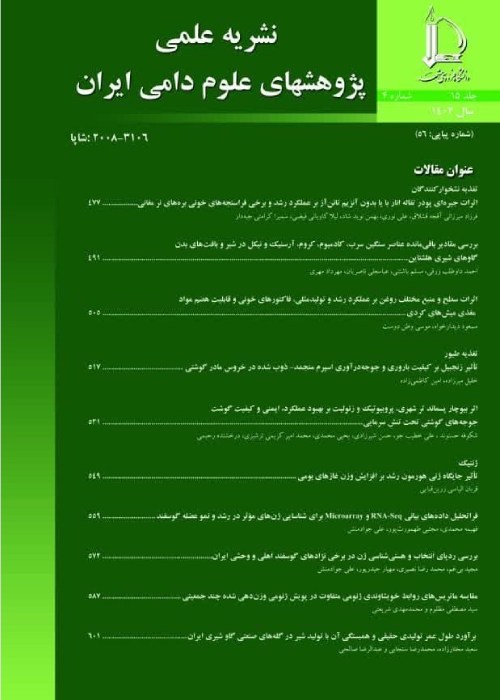Substitution of Roasted Whole Soybeans for Soybean Meal in Male Broiler Chicken Diets: Impact on Growth Performance, Carcass Traits and Blood Metabolites
Soybean meal (SBM) is the main source of protein in broiler diets. Interest has been increased in the use of roasted full-fat soybean (RFFS) as a replacement of soybean meal and fat in broiler diets. The use of full-fat soybean can eliminate the high cost of oil usage and allows the use of a protein supplement in the broiler diets. Full-fat soybeans could provide both protein and energy in one feed ingredient. Use of raw soybeans in poultry diets is not efficient due to presence of anti-nutrient factors like trypsin inhibitor factors. One method of raw soybeans heat processing is roasting the beans by a rotating chamber in which they are directly exposed to a flame. It has been reported similar weight gains by broiler chicks fed heat treated full-fat soybeans or SBM. Heat-treated full-fat soybeans have been included in broiler diets at the level of 15% and reported that body weight at 6 weeks of age were not significantly affected. In contrast, heat-treated full-fat soybeans in starter and finisher diets at the level of 30% reduced growth performance during the starter period. However, the adverse effects became less severe as bird age increases. In some cases weight gain significantly decreased by full-fat soybeans compare to SBM containing diets. When 100% of the soybean meal was replaced by roasted full-fat soybeans, body weight was significantly decreased at 3weeks of age. The high energy of full-fat soybeans may change carcass composition. It has been shown that carcass yield of broiler chickens improved 3% when soybeans were included 10% of the diet. Information about full-fat soybeans for broilers is limited. Therefore, the aim of this experiment was to examine the effects of substituting different levels of roasted full-fat soybean for soybean meal in diets of broiler chickens on performance and blood metabolites.
In order to evaluate the effects of roasted whole soybeans replacement for soybean meal in male broiler chicken diets on growth performance, carcass characteristics and blood parameters, a completely randomized design with four treatments and four replicates was carried out with 192 day-old Ross 308 male broiler chicks up 42 days. In this experiment, RFFS was roasted in 130 centigrade degrees for 30 minutes. All groups were fed with a standard starter diet during 1-14 d. RFFS was substituted in 4 dietary levels of zero, 25, 50 and 75 percent for soybean meal during growing (15-28 d) and finisher (29-42 d) periods. Diets were formulated to be isocaloric and isonitrogenous. Feed and water were provided ad libitum throughout the experiment. Body weight gain, feed intake, and feed conversion ratio (FCR) were measured during grower and finisher periods. Birds were reared on litter floor pens and a lighting program with 23:1 h light and darkness was used from 1-42 d. At day 42 after 3 h fasting, one bird from each replicate close to group mean weight was selected to determine carcass characteristics and blood parameters. Blood samples were taken from the wing vein and serum was separated by centrifugation at 3000×g for five min. The serum samples were kept in -20°C until analysis. Results and Discussion Results showed that 75% level of RFFS replaced with SBM significantly decreased weight gain, body weight at the end of each period and feed intake in grower period. In finisher period the replacement of 75% of SBM with RFFS, resulted lower body weight, daily weight gain and feed consumption in compare to other replacement levels (p < 0.05). FCR in grower period was not significantly affected by treatments but control group in finisher period had better feed conversion ratio compared to other treatments (p < 0.05). Carcass parts including breast, thighs and pancreas were not significantly affected by the treatments. But, liver and abdominal fat pad weights were increased when the FFSM level was increased to 75% substituting level (p < 0.05). RFFS had no significant effects on blood serum triglycerides, low density lipoproteins, lactate dehydrogenase and alanine transaminase concentrations. But, blood serum cholesterol and high density lipoproteins (HDL) concentrations in control group were significantly lower than other treatments. Serum aspartate transaminase concentration in 75% replacement level of RFFS for SBM was significantly lower than other treatments (p < 0.05). Serum creatine phosphokinase concentration in control group was significantly (p < 0.05) lower than other groups.
of this experiment revealed that replacement of 50% of diet SBM with RFFS during 15-42 days of age has no adverse effect on broiler chickens growth performance and increases blood HDL.
- حق عضویت دریافتی صرف حمایت از نشریات عضو و نگهداری، تکمیل و توسعه مگیران میشود.
- پرداخت حق اشتراک و دانلود مقالات اجازه بازنشر آن در سایر رسانههای چاپی و دیجیتال را به کاربر نمیدهد.


